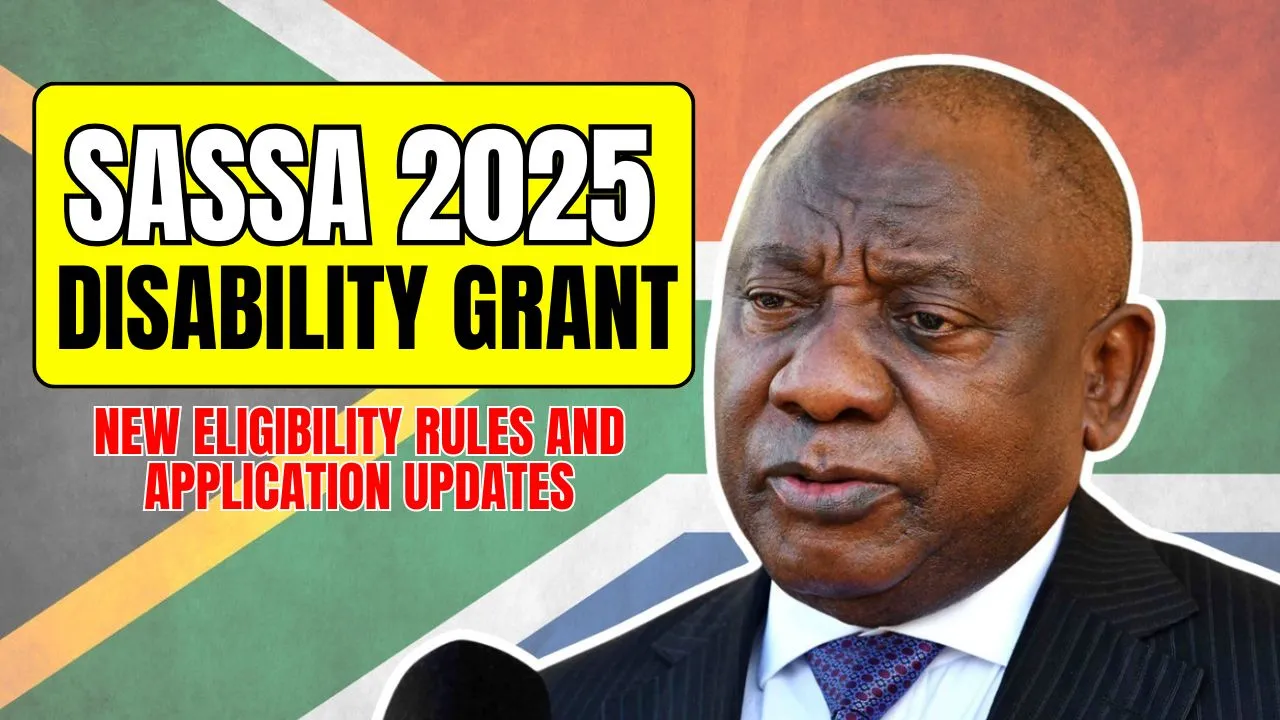SASSA Disability Grant 2025: The SASSA Disability Grant 2025 continues to be a crucial financial support system for South Africans living with disabilities. In 2025, the South African Social Security Agency has made important updates to improve how the grant is processed and disbursed. These changes are designed to make applying for the grant easier while ensuring that the financial assistance reaches those who truly need it.
In this article, we’ll explore all the updated information about the SASSA Disability Grant 2025, including who qualifies, how to apply, the documents required, payment amounts, and what to do if your application is declined. By understanding these key details, applicants can better navigate the process and access the grant without unnecessary delays.
SASSA Disability Grant 2025 Overview Table
| Details | Information |
| Age Requirement | 18 to 59 years old |
| Citizenship Status | South African citizen, permanent resident, or recognized refugee |
| Type of Disability | Temporary (6-12 months) or permanent (12 months+) |
| Annual Income Limit | R97,320 (single), R194,640 (married) |
| Asset Limit | R2,758,800 (single), R1,379,400 (married) |
| Monthly Grant Amount | R2,200 from April 1, 2025 |
| Application Method | In-person at nearest SASSA office |
| Key Documents Needed | ID, medical report, proof of income, proof of residence |
| Payment Methods | Bank transfer, SASSA pay points, Postbank |
| Appeal Options | Reconsideration form, Independent Tribunal appeal |
Step-by-Step Guide to the Application Process
Applying for the SASSA Disability Grant 2025 is a straightforward process if the correct steps are followed. To begin, applicants must visit their closest SASSA office. Once at the office, they will receive the necessary forms, which they need to fill out accurately. SASSA officers are available to assist those who need help completing the form.
All supporting documents must be submitted at the time of application. Once submitted, SASSA may schedule a medical assessment to confirm the applicant’s disability status. After the assessment and document review, SASSA will communicate the decision within 30 working days. If the application is approved, the grant payments will be arranged according to the updated disbursement schedule.
Essential Documents Required for Application
To apply for the SASSA Disability Grant 2025, certain documents are essential. The applicant must provide a valid South African ID or passport. If married, their spouse’s identification document is also required. A recent medical report, issued within the last three months, must confirm the nature and extent of the disability.
Proof of income is necessary, which can include recent bank statements or payslips. Applicants must also submit proof of residence, such as a utility bill or rental agreement. For those opting to receive payments via direct deposit, a stamped bank statement should be included. Additionally, if relevant, supporting documents like a marriage certificate, divorce decree, or spouse’s death certificate may be required. Having all documents ready ensures the process moves faster without unnecessary delays.
Eligibility Criteria for the 2025 Disability Grant
To be eligible for the SASSA Disability Grant 2025, applicants need to meet specific conditions. They must be between 18 and 59 years of age and either a South African citizen, permanent resident, or recognized refugee. A medical professional must certify that the applicant’s disability is severe enough to prevent them from working for at least 12 months. Temporary disabilities must have supporting medical evidence showing an inability to work for six to twelve months.
Financial requirements also apply. Single applicants must earn less than R97,320 per year, while married applicants have a limit of R194,640 combined income. The asset value threshold is R2,758,800 for single applicants and R1,379,400 for married couples. Additionally, applicants must not receive another social grant or reside in any state institution. Meeting all these conditions is necessary to qualify for financial assistance under this grant.
Grant Payment Amount and Disbursement Schedule
Starting April 1, 2025, the monthly amount for the SASSA Disability Grant 2025 is set at R2,200 per beneficiary. Payment schedules will be communicated to recipients through SMS notifications to help them plan their collection dates. Applicants are advised to wait for these messages before attempting to collect their payments to prevent long queues and unnecessary delays at payment centers.
Available Payment Methods for Beneficiaries
There are several payment options available for recipients of the SASSA Disability Grant 2025. The preferred method is direct deposit into the beneficiary’s bank account, as it is secure and the fastest way to receive funds. Applicants who do not have a bank account can collect their payments at designated SASSA pay points.
Alternatively, Postbank services are available for those who prefer electronic transfers, though it’s worth noting that additional transaction fees may apply depending on the service. Direct bank transfers are the most efficient way to avoid standing in long queues and experiencing potential payment delays.
Steps to Take if an Application is Denied
In cases where an application for the SASSA Disability Grant 2025 is denied, applicants have the right to request a review or appeal the decision. First, it is important to carefully read the reasons given by SASSA for the rejection.
Applicants who believe their case deserves reconsideration should visit the SASSA office and submit a Reconsideration Form. Additional documents or clarifications that strengthen the case can be provided during this step. If the reconsideration is unsuccessful, the applicant may then escalate the matter by appealing to the Independent Tribunal for Social Assistance Appeals. Assistance from legal aid organizations or social service groups is available to help guide applicants through the appeal process.
Staying Informed on Grant Updates
It is crucial for beneficiaries and applicants to stay informed about any changes or updates related to the SASSA Disability Grant 2025. The best way to do this is by checking the official SASSA website regularly and following SASSA’s verified social media platforms. Applicants can also contact the SASSA helpline for any specific inquiries regarding eligibility, payment dates, or application status. Staying updated ensures that applicants are aware of new developments and avoid any disruptions in their payments.
Conclusion
The SASSA Disability Grant 2025 continues to offer vital financial support to individuals living with disabilities in South Africa. With updated eligibility rules, increased payment amounts, and a streamlined application process, it’s now easier for beneficiaries to access the assistance they need. By following the correct steps, submitting complete documents, and staying informed on new updates, applicants can ensure smooth processing of their grant.
If you found this information helpful, feel free to share it with others who may benefit or leave a comment below. You can also explore more related content to stay updated on other SASSA grants and social assistance options.
FAQs
Who qualifies for the SASSA Disability Grant 2025?
Applicants between 18 and 59 years old who are South African citizens, permanent residents, or recognized refugees with a certified disability may qualify, provided they meet income and asset limits.
What documents do I need to apply for the grant?
You need a valid ID, medical report, proof of income, proof of residence, and if applicable, marriage or divorce certificates. Bank statements are required if opting for direct deposit.
How much is the SASSA Disability Grant 2025 per month?
The grant amount is R2,200 per month starting April 1, 2025.
How long does SASSA take to process the application?
SASSA typically communicates the outcome within 30 working days after submission and medical assessment.
What should I do if my application is rejected?
You can submit a Reconsideration Form with additional documents or appeal to the Independent Tribunal if reconsideration is unsuccessful.

















